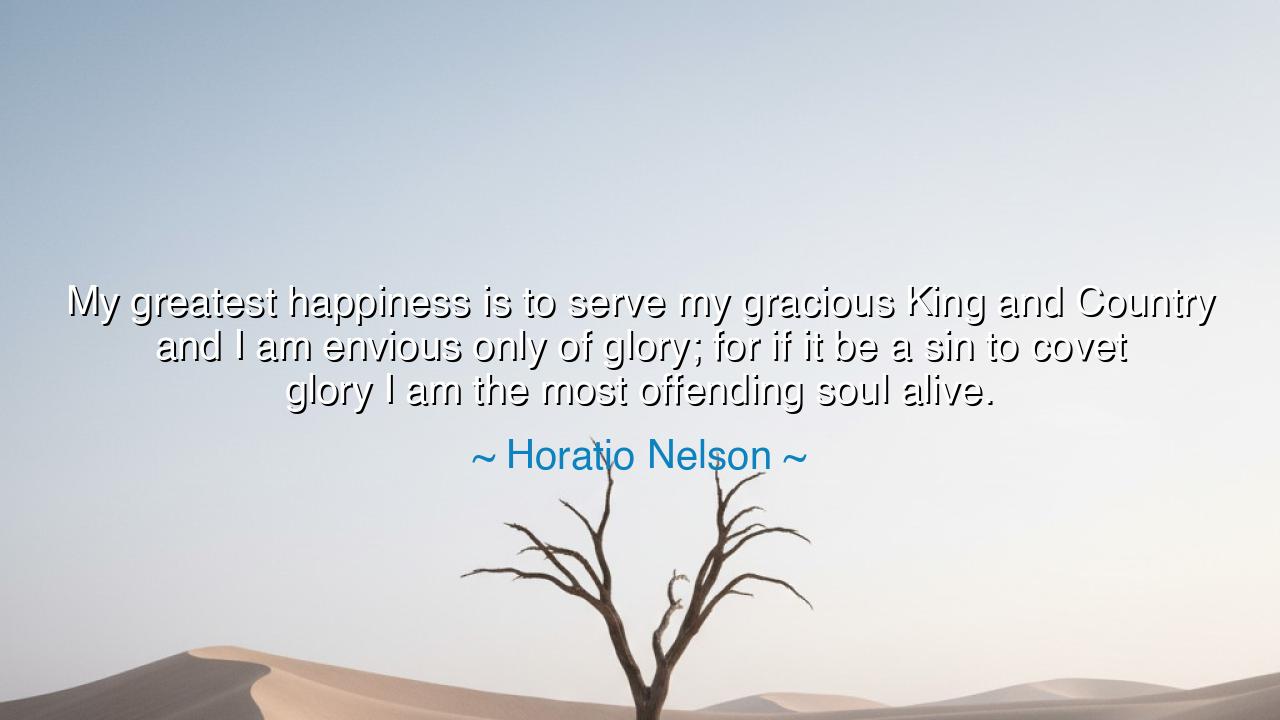
My greatest happiness is to serve my gracious King and Country
My greatest happiness is to serve my gracious King and Country and I am envious only of glory; for if it be a sin to covet glory I am the most offending soul alive.






“My greatest happiness is to serve my gracious King and Country, and I am envious only of glory; for if it be a sin to covet glory, I am the most offending soul alive.” – Horatio Nelson
In these immortal words, Admiral Horatio Nelson, the lion of the British seas, bares the very essence of the warrior’s heart. His voice, though shaped by an age of empires, speaks a truth that transcends time: that the noblest joy of man lies not in comfort, not in wealth, but in service — the service of something greater than himself. To Nelson, that greatness was his King and Country, the ideal for which he lived, fought, and ultimately died. Yet beneath his loyalty burns another fire, that of the pursuit of glory — the longing to carve his name upon the winds of history, to prove through action that his life had meaning. He admits this hunger without shame, even calling himself “the most offending soul alive” if to covet glory be sin. Thus, his words reveal the paradox of the hero’s soul: selfless devotion bound to the yearning for eternal remembrance.
The origin of this declaration lies in the spirit of Nelson’s life — a life of battle, brilliance, and sacrifice. Born into modest means, he rose not by privilege but by valor, his genius on the seas matched only by his courage. He spoke these words during the height of his career, when his victories at the Nile and Copenhagen had already made him a legend. Yet glory for Nelson was not vanity alone; it was the echo of duty fulfilled, the proof that his struggles were not in vain. He saw glory as the crown of service — the light that shines upon those who give everything for the cause they love. In his heart, glory and duty were not rivals, but companions.
For in Nelson’s time, the seas were the stage upon which nations wrestled for destiny. He knew that every decision he made, every risk he took, bore the weight of his people’s fate. In that crucible, fear must yield to faith, and comfort must bow before duty. Yet Nelson’s greatness lay not only in his victories, but in his humanity — in the way he felt deeply, loved fiercely, and believed wholly in what he served. He did not see himself as a machine of war, but as a man bound by devotion, driven by the belief that service itself is happiness. “My greatest happiness,” he said, “is to serve.” To him, the act of service was not sacrifice, but fulfillment — the realization of purpose that gives life its meaning.
The desire for glory, however, is the ember that gives such devotion its heat. The ancients knew this well. Alexander the Great, though master of half the known world, wept because there were no more worlds to conquer. Yet beneath his ambition lay the same yearning Nelson confesses — the wish not merely to live, but to live memorably. For to serve without seeking glory is noble, but to serve while daring to reach for glory is divine. Glory, rightly sought, is not vanity — it is the soul’s rebellion against oblivion. It is the echo of man’s desire to leave behind a legacy worthy of the gods. Nelson’s honesty in confessing this longing does not diminish him; it ennobles him. He does not crave glory for himself alone, but as a reflection of his King, his Country, and the eternal values they represent.
We may see this spirit in Nelson’s final hour at Trafalgar, where he led his fleet into battle against overwhelming odds. As cannon fire thundered and the sea boiled with flame, he stood upon the deck of the Victory, calm and resolute. When struck by the bullet that would end his life, his final words were not of regret, but of triumph: “Thank God, I have done my duty.” Even in death, his joy was not in survival, but in service. His glory was not in conquest, but in the fulfillment of purpose — in knowing that he had lived as he believed, and given his all for what he loved.
To serve and to seek glory — these are not contradictions, but two sides of the same heroic coin. Service gives the soul meaning; glory gives it immortality. The one grounds man in virtue, the other lifts him toward the eternal. Yet Nelson’s teaching warns us subtly as well: the pursuit of glory must be guided by honor, not ego. True glory comes not from being praised, but from being worthy of praise. It is born from sacrifice, integrity, and the courage to act rightly even when no one watches.
So, my children, learn from the heart of Nelson: find your happiness in service, and your glory in duty. Whatever your cause — your family, your country, your calling — serve it with all your strength and love. Let your hands work with purpose, your heart beat with loyalty, and your mind burn with the desire to leave the world better than you found it. Do not fear the longing for greatness, for it is the natural cry of the human spirit; but temper it always with humility and honor.
For in the end, as Nelson’s life teaches, the truest glory is not in medals, nor in monuments, but in the memory of a life lived bravely and selflessly. To serve is happiness; to serve with courage is glory. And he who lives thus, though he dies, shall live forever in the hearts of those who remember the light he left behind.






AAdministratorAdministrator
Welcome, honored guests. Please leave a comment, we will respond soon